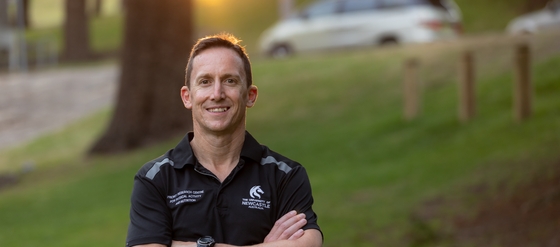
Q&A with Dr Eden Barrett
GrainSwitch: targeting online grocery shopping to encourage heart-healthy grain choices
Dr Eden Barrett is a Dietitian, Conjoint Lecturer at UNSW and a Research Fellow (Food Policy) at The George Institute for Global Health.
Dr Barrett received a 2023 Vanguard Grant for her project GrainSwitch: An innovative online grocery shopping intervention to encourage healthy grain food choices among Australians at risk of cardiovascular disease.
What are you currently researching?
I am currently working on a project that promotes eating whole grain foods like oats, wholemeal bread, and brown rice, which are all important for heart health and can help prevent heart disease. In Australia, it can be challenging for people to choose good quality whole grain foods when grocery shopping because there is lack of regulation on whole grain labelling. Some products are labelled as ‘sources of whole grain’ even when they only contain small amounts of whole grain.
To address this, we are developing an online grocery shopping tool called GrainSwitch.

This tool will help people identify high quality whole grain foods by providing clear information about whole grain content in packaged foods and encouraging them to choose alternatives with higher whole grain content. We will test GrainSwitch with a diverse mix of people, using their feedback to improve the tool for future trials in Australia."
Dr Eden Barrett
Research Fellow (Food Policy)
What difference will your research make to people’s cardiovascular health in Australia?
In Australia, people are not eating enough whole grains. Around one third do not consume any whole grains, and those who do eat less than half of the recommended three servings per day.1 This is a problem because low whole grain intake is a major dietary risk factor for heart disease.2,3 GrainSwitch will help people easily identify and choose whole grains while grocery shopping, which will significantly improve heart health in Australia.
What motivated you to do your research?
As a dietitian, I am passionate about the role of diet in preventive health. Despite research continuously showing us that low whole grain intake is a major dietary risk factor for heart disease, people in Australia are unaware about the health benefits of whole grains, or the recommended amounts they should eat.4,5 Almost three in four adults in Australia do not meet the recommended daily target intake for whole grains, and those with minimal intake of whole grains often choose refined (i.e. ‘white’) versions.1 Unlike fruits and vegetables, where the advice is to eat more, the advice for grain food consumption is to replace refined grains with whole grains.6 The GrainSwitch tool aligns with this goal by encouraging people to swaps refined grains for whole grain alternatives.
Are there any achievements or discoveries from the past year you can share with us?
In my PhD research, I explored the barriers people in Australia face in eating whole grain foods. I found that a major barrier is the difficulty in identifying good sources of whole grains, with confusion often arising from a product’s appearance or packaging.5 For example, many people assume that a bread labelled 'multigrain' is high in whole grain, but often it is made from 100% white flour with a small amount of added seeds and grains. These findings highlight the need for nutrition education tools that go beyond recommending the consumption of whole grains. We need tools to identify specific products with high whole grain content, which is what GrainSwitch will achieve.
What role has Heart Foundation funding had in your career journey?
The Heart Foundation Vanguard Grant allows us to pilot GrainSwitch, including with people at high risk for heart disease. A major focus of this pilot study is to identify how GrainSwitch can be improved to enhance the consumer experience. The data gathered from this project will be essential for refining GrainSwitch for a larger, long-term trial to assess its impact on heart health risk outcomes.
Do you have a message for Heart Foundation supporters?
We are deeply grateful to Heart Foundation donors and supporters for funding this Vanguard project. Your generosity and commitment to improving the heart health of people in Australia will enable us to implement our innovative nutrition intervention, which we believe will significantly benefit many lives.
References
- Galea LM, Beck EJ, Probst YC, Cashman CJ. Whole grain intake of Australians estimated from a cross-sectional analysis of dietary intake data from the 2011-13 Australian Health Survey. Public Health Nutr. Aug 2017;20(12):2166-2172. doi:10.1017/s1368980017001082
Hu H, Zhao Y, Feng Y, et al. Consumption of whole grains and refined grains and associated risk of cardiovascular disease events and all-cause mortality: a systematic review and dose-response meta-analysis of prospective cohort studies. The American Journal of Clinical Nutrition. 2023;117(1):149-159. doi:10.1016/j.ajcnut.2022.10.010
Barrett EM, Batterham MJ, Ray S, Beck EJ. Whole grain, bran and cereal fibre consumption and CVD: a systematic review. British Journal of Nutrition. 2019;121(8):914-937. doi:10.1017/S000711451900031X
Foster S, Beck E, Hughes J, Grafenauer S. Whole grains and consumer understanding: investigating consumers' identification, knowledge and attitudes to whole grains. Nutrients. 2020;12(8)doi:10.3390/nu12082170
Barrett EM, Foster SI, Beck EJ. Whole grain and high-fibre grain foods: how do knowledge, perceptions and attitudes affect food choice? Appetite. 2020;149:104630. doi:10.1016/j.appet.2020.104630
National Health and Medical Research Council. Australian Dietary Guidelines. Providing the scientific evidence for healthier Australian diets. Accessed 28 August, 2024. eatforhealth.gov.au/guidelines/guidelines
You might also be interested in...

Q&A with Dr Siew Lim
Dr Siew Lim is a research fellow and Accredited Practising Dietitian specialising on health equity and women reproductive health, with a focus on gestational diabetes mellitus (GDM).

Q&A with Dr Thanh Nho Do
Developing a new soft robotic heart device to help people with heart failure awaiting a heart transplant

Q&A with Professor Philip Morgan
Improving the heart health of Aboriginal and Torres Strait Islander families living on Darkinjung Country – Healthy Dads, Healthy Mob ‘biya yadha gudjagang yadha
Last updated09 April 2025
